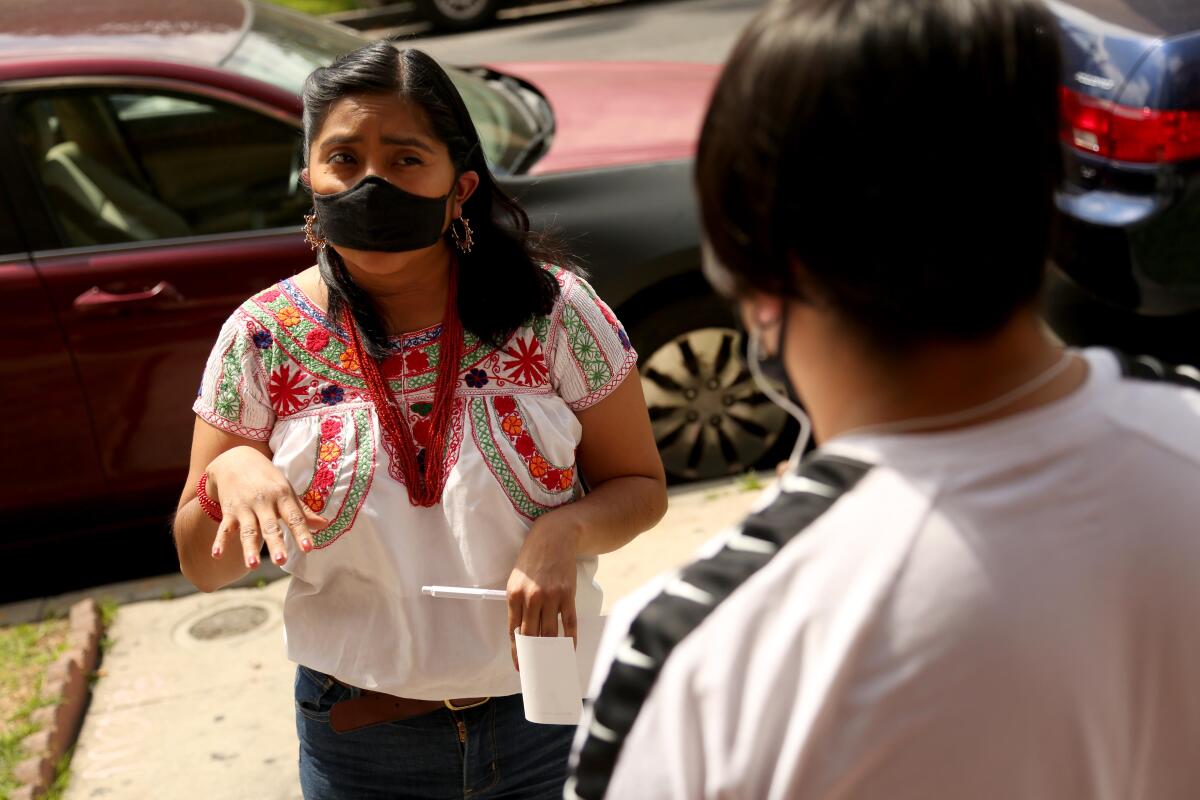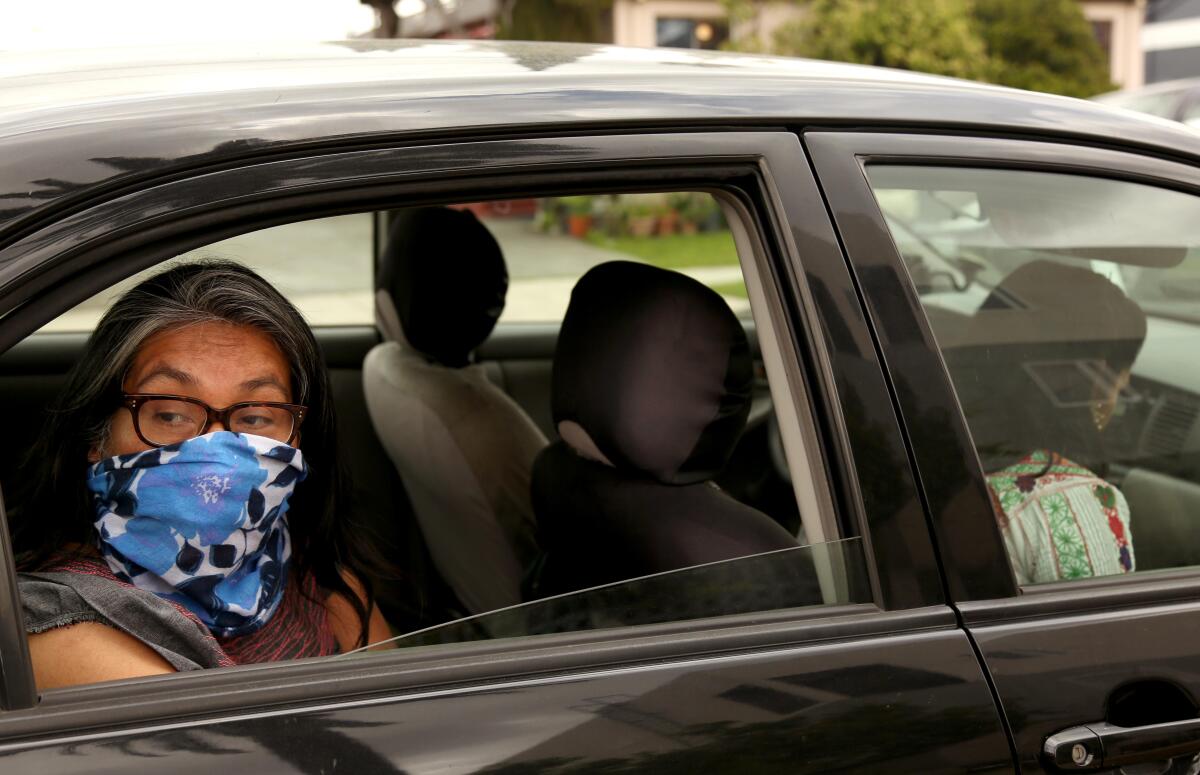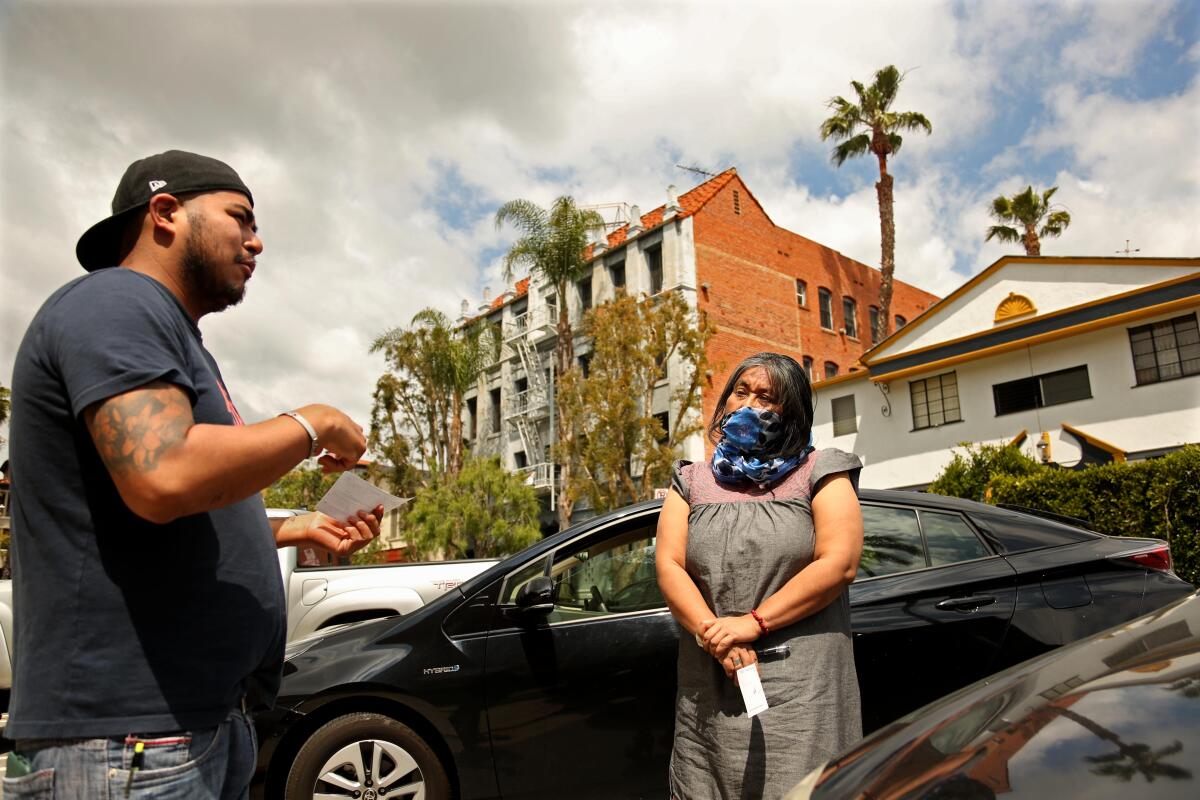California’s indigenous Mexicans and Guatemalans miss vital pandemic information due to language barriers

- Share via
Juan Luis, who moved to Los Angeles from a tiny town in Oaxaca and primarily speaks the indigenous language Zapotec, knew he was missing information about the pandemic changing life around him.
In March, the 24-year-old didn’t fully understand why people on the street were wearing masks. He watched news about the coronavirus spreading around the globe on TV at his restaurant job and at the laundry, but the Spanish subtitles moved too fast.
One day, Luis discovered a video on social media that used illustrations to explain in Zapotec what the coronavirus was and how people should wash their hands frequently, not touch their face, and keep their distance from others.
It hit home. Two days later, Luis bought three masks from a street vendor. He began cleaning his hands more frequently and wiping the door handle at his home. He shared the minute-long video with his Zapotec-speaking housemate, who immediately worried about what would happen to her child if she got sick.
“I didn’t know how serious it was,” said Luis, who arrived in L.A. five years ago and lives in Koreatown. “I realized the gravity of what was happening.”
The video came from CIELO, a local indigenous organization whose leaders are among activists across the state working to keep Mexican and Central American indigenous communities informed about the pandemic. Advocates have done outreach through phone calls and educational videos, and by broadcasting information on radio stations in native languages.
There is no complete census count on the number of indigenous people from Mexico and Guatemala living in Los Angeles, many of whom work in low-wage service-sector jobs. Their languages can be as different from Spanish as Chinese is from English, and can contain dozens of variants. The city is home to Mexicans who speak languages such as Zapotec, Mixtec and Triqui, as well as Guatemalan Maya who speak languages like K’iche’ and Q’anjob’al. Many have only a basic grasp of Spanish.
“We’re everywhere and people don’t know that,” said CIELO co-founder Odilia Romero. “They say the food industry is all Latino, the busboys are all Latinos. A lot of the busboys, a lot of the cleaning crew, are of indigenous background, and it’s crucial they have all that information — how to protect themselves, how to get access to resources — in their languages.”

In rural parts of the state, many indigenous immigrants work as farmworkers. The Mixteco/Indigena Community Organizing Project, a group that helps indigenous farmworker families in Santa Barbara and Ventura counties, has been transmitting warnings about the virus and price gouging into languages like Mixtec, Zapotec and Purepecha on its radio station, Radio Indigena 94.1 FM.
Executive director Arcenio Lopez said it’s critical that the information reach farmworkers, who face challenges with social distancing. They frequently have to share rides to work, and families often live together in the same housing unit.
“There’s this concern, are these people really understanding, is there a lack of accurate information in their language?” he said.
Farther up north, KBBF-FM, a multilingual public affairs radio station in Santa Rosa that serves Latinos and indigenous farmworkers, has been broadcasting information in languages like Mixtec and Triqui.
Rafael Vazquez, a radio station volunteer and professor at Santa Rosa Junior College, is a regular guest on a show with a host who speaks Mixtec. They recently took a call from a farmworker who said that an employer hadn’t provided enough paper cups next to water containers — forcing workers to share — or adequate shading to allow for social distancing.
Vazquez and the host explained that farmworkers should report their concerns to legal aid groups like the California Rural Legal Assistance.
“The person was asking for information to be provided in Mixteco,” he said. “I keep hearing from people who are indigenous whose Spanish may not be their first language that they are not getting the information.”
Another volunteer, 21-year-old Maribel Merino, has been answering questions on the air in Triqui about where to get food, what to do about rent, and financial assistance. She’s dealt with misinformation. Two Oaxacan Triqui speakers in Solano and Mendocino counties recently told her they hadn’t left their homes because they were worried they could be fined.
“There are people that don’t speak Spanish. They don’t know where to get help, they don’t know what to do,” said Merino. “They lock themselves in their house and are scared to go out.”
Undocumented indigenous immigrants also have access to fewer government resources. They can’t receive unemployment benefits, but the governor of California in April announced a $125-million relief effort to help about 150,000 Californians without legal immigration status. The proposal would offer $500 cash grants for individuals in the U.S. illegally and up to $1,000 for families. The money will be distributed by regional nonprofit groups.
That’s why grassroots-level help, often passed through word of mouth, can be a lifeline.
At Terroni, an Italian restaurant in downtown L.A. where 26-year-old Luis Lopez Resendiz worked for two years as a busboy, most of the kitchen staff were indigenous. Maya dishwashers spoke K’iche’. Cooks would chat with busboys in Zapotec.
After many were told to stop coming in when L.A. restaurants closed for dining, anxious workers reached out to Lopez Resendiz, knowing he worked at CIELO.
They have asked him about how to get food and financial support. Some have worried about not being able to send money to their families back home. They’ve been troubled by news that people who died of the coronavirus in the U.S. then faced barriers in being transported back home for burial.
“Many of them are desperate,” said Lopez Resendiz. “They’re looking for jobs to do on the side, but there’s nothing. The jobs that are available is at the grocery stores where you can be exposed to COVID-19. But they can also not get a job because they are undocumented.”

So far, CIELO has delivered $400 checks to more than 30 families from a grant it received and has also given supermarket gift cards to more than 70 families. It has helped people like Francisco Vasquez Gonzalez, a 31-year-old immigrant from Oaxaca who arrived in L.A. three years ago.
Before the pandemic, Gonzalez would leave his home at 7 a.m. every day and return at midnight. He received daily meals at two Century City restaurants where he worked as a cook, leaving him with very few expenses. He’s lost his jobs at both and has had to stock his home with food for the first time.
“I can pay rent, but I won’t have enough money to eat,” he said.
Others suffering economic hardships have tried to do their part by keeping people from their hometowns informed. Juan Ramos, a 32-year-old K’iche’ speaker from Totonicapan, Guatemala, tried unsuccessfully to find a job after he lost work as a busboy at two restaurants.
He arrived in Los Angeles more than a decade ago and has always sent anywhere from $100 to $300 a month back home to his parents. He recently told his mother he didn’t think he’d be able to send even $50.
“I got really sad. I have always helped her,” he said. “I never thought this could happen in the United States.”
Ramos has shared a video from CIELO explaining the pandemic in K’iche’ with a cousin who speaks neither Spanish or English well. He advised his cousin, who is in his late 20s, to wear gloves and a mask when riding the bus.
“After we showed him the video and explained in K’iche’, he understood better,” said Ramos. “He took more precautions. He started keeping his distance.”
More to Read
Sign up for Essential California
The most important California stories and recommendations in your inbox every morning.
You may occasionally receive promotional content from the Los Angeles Times.















